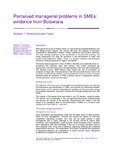Please use this identifier to cite or link to this item:
http://hdl.handle.net/10311/47| Title: | Perceived managerial problems in SMEs: evidence from Botswana |
| Authors: | Temtime, ZT Pansiri, J. |
| Keywords: | Small to medium-sized enterprises SMEs Economics Botswana |
| Issue Date: | 2006 |
| Publisher: | Development and Learning in Organisations; Emerald Group Publishing Ltd; www.emeraldinsight.com/reprints |
| Citation: | Temtime, ZT & Pansiri J 'Perceived managerial problems in SMEs: evidence from Botswana' / Development and Learning in Organisations Vol. 20, No. 5 (2006) pp. 15-17 |
| Abstract: | Although the discovery of mineral wealth (i.e. diamond) has propelled Botswana into the middle-income category, the country still faces the problem of economic diversification, employment creation, income distribution and poverty alleviation. The main strategy employed by the government to diversify the economy and create employment has been the promotion of the development of small- and medium-sized enterprises (SMEs). There is a general consensus that Botswana should not continue putting all its ‘‘eggs in one basket’’. The most common argument in favor of SMEs is that they are sustainable forms of diversifying the economy away from mining; they create substantial job opportunities; and they help narrow the gap between urban and rural development, and alleviate poverty. SMEs employ more people per unit of investment as compared to large firms. The prevalence of low-skill and unskilled labor force in the economy coupled with the tendency of the government to reduce its role as primary employer made the promotion of SMEs a primary source of employment creation, income generation and poverty alleviation. The objective of the study was to investigate how managerial problems are affecting the performance and development of SMEs, and analyze the relationship between these factors and firm specific demographical variables, and the association among the problems themselves. Data were collected from through questionnaire from 250 SMEs. The majority of the sample firms were small in size (70 percent), owned by males (78 percent) and concentrated in the non-manufacturing sectors (merchandising and service) (90 percent) of the economy. Respondents were asked to rate the impact of 34 managerial items on the performance of SMEs on a five-point scale ranging from 5 (very high) to 1 (very low). |
| URI: | http://hdl.handle.net/10311/47 |
| ISSN: | 1477-7282 |
| Appears in Collections: | Research articles (Dept of Management) |
Files in This Item:
| File | Description | Size | Format | |
|---|---|---|---|---|
| temtime_perceived_managerial_problems.pdf | 586.77 kB | Adobe PDF |  View/Open | |
| license.txt | 1.95 kB | Text | View/Open |
Items in DSpace are protected by copyright, with all rights reserved, unless otherwise indicated.
